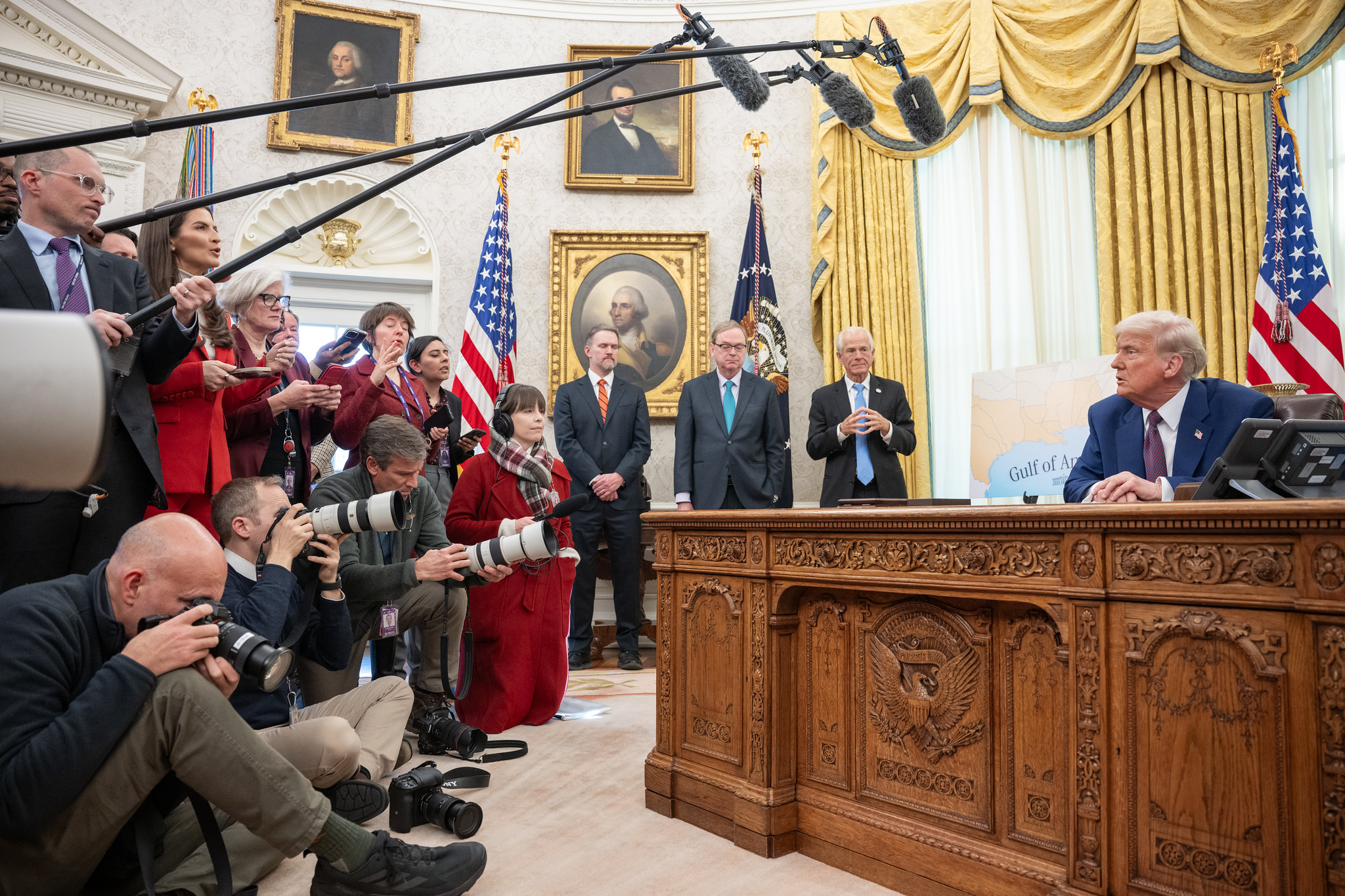


During all the meltdowns about Donald Trump’s election being a “threat to democracy,” someone observantly noted that all the panic made sense once you replaced the word “democracy” with “bureaucracy.” Now, as D.C. journo types panic about the threat to a “free press” posed by Trump’s breakup of the White House Correspondents’ Association monopoly, replacing “free press” with “corporate media’s control of news narratives” provides similar clarity.
On Tuesday, Press Secretary Karoline Leavitt announced the White House would have the final say on which reporters have access to President Trump in the “most intimate spaces” such as the Oval Office as part of the 13-member press pool. Gatekeeping this access was previously the purview of the group of “D.C.-based journalists” who make up the White House Correspondents’ Association (WHCA).
“Legacy media outlets,” including “the five major television networks,” would still be included in the rotation, Leavitt clarified, but so would outlets that have “long been denied the privilege” of close access to the president.
In response, the WHCA — led by the manicured (and often, for some reason, caped) Eugene Daniels of Politico — released a four-paragraph statement claiming the decision “tears at the independence of a free press in the United States.”
Other members of the corporate press quickly joined in to share similar talking points about the “free press.”
The editors of the Associated Press, Bloomberg News, and Reuters co-wrote a statement noting “an independent, free press” is “essential in a democracy,” and declaring that such a “principle” would be “threaten[ed]” by any limitation of the AP’s, Bloomberg’s, or Reuters’ special White House access. Former WHCA President Kelly O’Donnell of NBC News urged readers to “Show your support for a free press.” Axios CEO Jim VandeHei warned “Trump is setting a new precedent for tight, punitive government control over a free press.”
The New York Times, in a story about the change, quoted its own spokesman to call the change “an effort to undermine the public’s access to independent, trustworthy information.” The paper’s chief White House correspondent said the move reminded him of Putin.
Even former “Meet the Press” host Chuck Todd, whose journalistic credentials include airing a deceptively edited clip of Bill Barr and asking Vivek Ramaswamy if he knew there are two sexes “as a scientist,” emerged from his semi-retirement to join the “free press” panic.
But the corporate press and their representatives who run the WHCA haven’t actually been concerned about the integrity of the fourth estate for some time. They were the ones, after all, who spread the Russia collusion hoax, the character assassination of Brett Kavanaugh, the narrative that the Hunter Biden laptop was Russian disinformation, propaganda about Covid lockdowns and masks and vaccines and the virus’ origins, etc., etc. And all that special White House access they’ve enjoyed? Despite having more opportunities to observe Biden up close than nearly anyone in America, they helped cover up the cognitive decline of the 46th president for years because he was running for reelection.
In each of those cases, legacy media outlets just so happened to be exactly in line with what Democrats in Washington were saying. That is not how an independent press works.
The WHCA is so “independent,” in fact, that after Courtney Subramanian of the Los Angeles Times was caught asking then-President Joe Biden a question that had been fed to the White House ahead of time, the WHCA rewarded her with a seat on its board. It is so committed to freedom of “access” that it refused to take a position when the Biden White House revoked the “hard passes” of 442 reporters, roughly a third of the journalists who held such credentials.
The media are pearl-clutching about a “free press” because it’s not as empathy-inducing to say, “Donald Trump is a threat to the legacy media cartel’s monopoly over The Narrative.” But that’s exactly what they’re afraid of losing, and why they’re so offended that the Trump administration would stop them from gatekeeping White House access and boxing out alternative media.
Outlets with longstanding privileges like the AP or The New York Times have enjoyed being able to use their power to go after political enemies without fear of repercussions. They were horrified when Trump sued ABC News for falsely alleging he had been found liable for rape — and won, to the tune of $15 million.
Big Media is still licking its wounds from Trump’s election in November, which they rightly took personally. Remember that anonymous TV executive fretting a week before the election that “a Trump victory means mainstream media is dead in its current form”? After declaring Trump public enemy No. 1 for eight years, the media failed their goal of keeping him from returning to the White House.
Since that stinging defeat, they have been considerably weakened, but they still feel very strongly about holding onto what power they have left. The rejection of the WHCA gatekeepers, who have proven themselves unwilling to use their privileges to serve the public, is another big blow to their monopoly — and a good thing for real press freedom.
